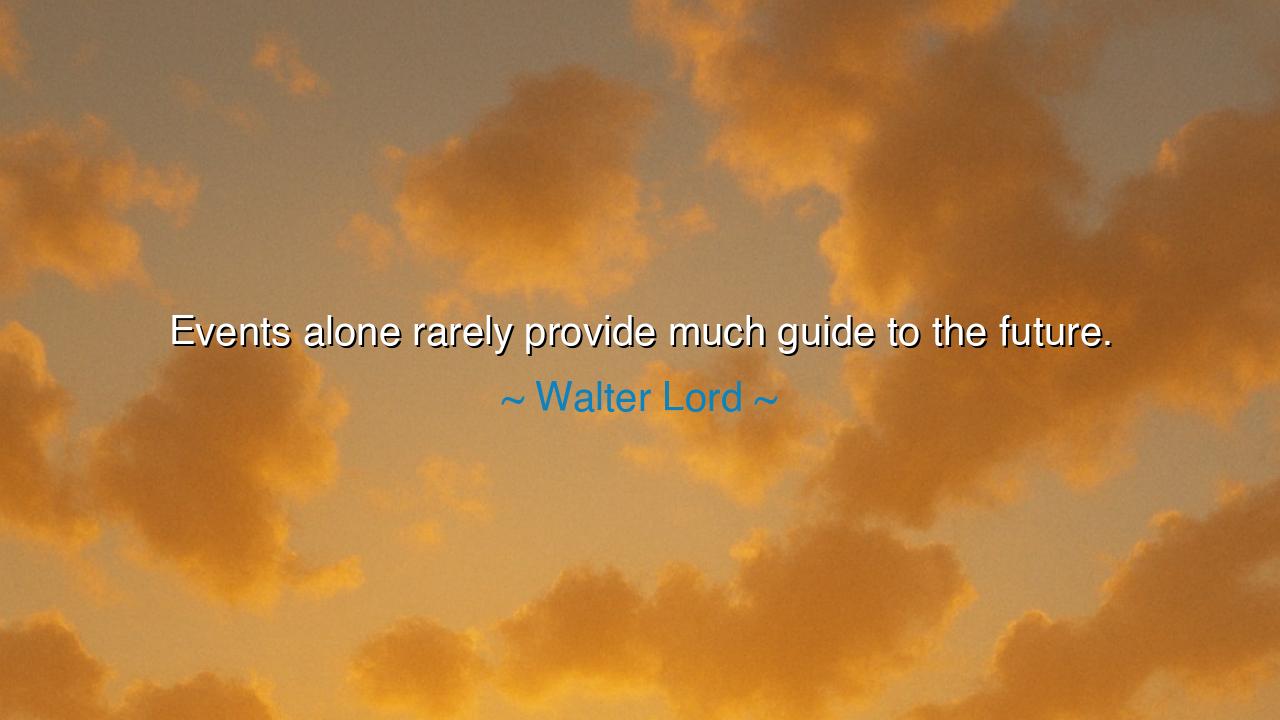
Events alone rarely provide much guide to the future.






In the contemplative words of Walter Lord, historian of human courage and folly, we hear a truth as sharp as it is enduring: “Events alone rarely provide much guide to the future.” This insight, born from a lifetime studying the tides of history, reminds us that the unfolding of destiny cannot be read merely in the surface ripples of what happens, but in the deep currents of human nature that lie beneath. Lord — best known for chronicling the tragedy of the Titanic in A Night to Remember — understood that events are but the visible tip of an invisible pattern, and that wisdom lies not in the memory of moments, but in the understanding of their meaning.
When Lord penned these words, he was reflecting on the illusion that history repeats itself in a simple and predictable rhythm. He saw that while events — wars, disasters, revolutions — may seem to echo across the ages, each arises from the unique convergence of countless unseen causes: fear, hope, ambition, ignorance. To look at events alone is to stare at shadows cast upon the wall; to look beneath them is to see the fire that created them. Thus, knowledge of history is not enough; one must learn the spirit that moves within it. Only then can the future be read with clarity.
The ancients understood this wisdom well. The Greek historian Thucydides, writing of the Peloponnesian War, declared that human nature, not chance, is the true engine of events. Empires rise and fall not because of fate, but because of pride, greed, and forgetfulness. So too, Walter Lord reminds us that what repeats in history is not the event itself, but the pattern of the heart that produces it. To mistake the burning of Troy for the fall of Rome, or the sinking of the Titanic for the crash of the Challenger, is to miss the deeper lesson: it is not the fire or the ice that destroys us — it is our arrogance in thinking we are immune to either.
Consider the Titanic itself, the subject of Lord’s most famous work. It was called “unsinkable,” built with the finest steel, commanded by the proudest men of its age. Yet within a single night, it sank beneath the cold Atlantic, carrying more than fifteen hundred souls to their deaths. To see the sinking as a singular event is to pity its tragedy and move on; but to see it as symbol, as lesson, is to understand the eternal warning — that human progress, untempered by humility, breeds its own destruction. Thus, Lord’s quote is not about ships or seas, but about the human tendency to learn little from what we endure.
In every century, this blindness repeats. After great wars, nations cry, “Never again,” yet march once more into battle. After financial collapses, markets rebuild the same fragile towers of greed. After disasters, promises are made and quickly forgotten. Why? Because we mistake events for wisdom. We believe that the memory of pain is enough to prevent its return, forgetting that memory fades, but habit endures. Walter Lord saw this clearly: that events teach nothing to those who do not look beyond them, who fail to ask, “What in us caused this, and what in us must change?”
His words carry a quiet but powerful warning — that understanding, not occurrence, is the true foundation of foresight. The wise do not wait for catastrophe to reveal the truth; they read the hidden signs long before the storm. They study not just what happens, but why it happens, and in that knowing, they prepare their souls and societies against repetition. The fool, by contrast, looks only at the surface and says, “That was then — it cannot happen again.” But the wise know that time changes its mask, not its nature.
Therefore, my child, heed this teaching: do not be content to watch history pass like waves against the shore. Seek the currents beneath — the desires, fears, and follies that drive them. In your own life, too, do not trust that one failure or triumph defines what will come; look instead to the habits of your heart, for they are the seeds of your future. Reflect upon your past not as a chain of events, but as a pattern of choices, each whispering of who you are and who you are becoming.
For Walter Lord’s truth is eternal: events alone are but the footprints of time, while understanding is the path itself. To see only what has happened is to walk in darkness; to grasp why it happened is to carry a torch into the future. Learn not from the event, but from the heart that made it — and you will never walk blind into what comes next.






AAdministratorAdministrator
Welcome, honored guests. Please leave a comment, we will respond soon